- Home
- Alice Walker
Living by the Word Page 5
Living by the Word Read online
Page 5
After meeting Bill Wahpepah that day in Custer, where signs of the exploitation of Indians still abound (wooden “cigar-store” Indians, fake war bonnets, and “Indian” silver-and-turquoise jewelry fill the store windows along the main street), I stood in front of the courthouse where the trial was to be held and waited for the doors to open. When they finally did open, after a very long time, the white Southern-looking and Southern-sounding officer advised us that only a fraction of the large crowd outside (several hundred women, children, and men, including three Buddhist monks—although I discovered months later that at least one of them was a woman—who were beating gongs) would be let inside. A few family members, a few of the elders, a few of the press. I was none of these. I was merely a witness, at the moment rather feeble from the blows of oppression that, in the case of the Indians, I could see were presumably unending; I was only a pair of eyes, a body, a flagging though faithful heart. But out of the crowd Big Bill appeared. He seemed enormous, and was—two hundred pounds at least—very dapper in vest, long braids, headband, and beads. And, taking me by the shoulders with his large hands, he propelled me forward until I stood in the midst of the elders, a group of ancient, intricately wrinkled Indian women, wrapped in blankets. I was remarkably content to be there, as we all settled in, huddled together, to wait.
Eventually both Belvie and I were admitted to the courtroom, but only for a short portion of the trial. No one, beyond the family, the elders, and the white men who represented the press, was to see this carriage of “justice” from start to finish. We were at least able to see Dennis and Kamook and their children, their love for one another announced in every movement of their bodies and every glance of their apprehensive eyes. Dennis was especially beautiful in a red robe, with feathers in the long braids that hung down his back and with sneakers on his feet, though his face had the haggard pallor of one whose fate has for generations rested in the hands of his enemies.
Shortly after the trial—Dennis had been sentenced to prison for three years—and after I had returned to San Francisco, I was asked by Bill Wahpepah to join the program of a fundraiser for the International Indian Treaty Council, of which he was director of information. One of the things the Council does is connect Indians of all continents with each other; today, because of people like Bill Wahpepah, indigenous peoples from New Zealand to Nicaragua are talking together, sharing their experiences and struggles. To my mind, this is one of the best things happening on the planet.
To his surprise, I think, I said yes. Some of Bill’s style is expressed in his letter to me about the event. “Dear Alice,” he wrote, “we have this idea of asking you to read with this man, John Trudell…” Enclosed was a tape of John’s work. An incredibly powerful and sensitive poet, whose family had been firebombed to death in retaliation for his activity in the American Indian Movement at Wounded Knee, John moved me profoundly, as did the beating of the ceremonial drum over which he read. I was delighted to read with him. On the night of the event I asked Bill if it would be appropriate for the drums to sound for me, as well. He said “sure,” and invited the drummers to drum as I read. There were six of them around the large drum, and their steady, ancient drumming seemed to reawaken in me the very beat of my nearly dormant poet’s heart. I knew that my spiritual reassessment had reached another plateau and that my political hibernation was over.
Bill and I were to work together several times before he died. When I learned he was not well—he spoke many times about the earlier years of his life, when the use of drugs and alcohol constituted his response to despair—I invited him and his family to visit with me in the country. Actually, that expression “to visit with” is Bill’s. The first time, he came with his wife, Carol, and the boys, Renchul and Choko; the second time, he came alone. I was not there—for some reason, it was always hard to synchronize our “visiting”—but a friend who stopped by tells a lovely story of Bill blissed out, naked as a jaybird (presumably), splashing about in the pond. It was during that visit that he planted tobacco seeds in the garden, very neatly and with their own little staked fence. (They never came up; when I asked Bill about them he said he’d gotten them from some old-timer on the reservation, and, no, he had no idea why they didn’t come up. He knew very little about such things, he said. We laughed at this admission.) He hung tiny “medicine bundles” of cedar, with wrappings of red flannel, from trees in the yard and over the front door. I was left also with a substantial supply of sage, some of which Bill had burned in an abalone shell, which still retained the residue. This was rather wonderful: to walk into my studio after Bill’s visits and to find these unexpected gifts, not the least of which was the smell of sage smoke. I always think of the place where I work as holy; Bill seemed to sense that instinctively, and, indeed, we once had a brief conversation, if I remember correctly, in which I told him that I’d come to understand my work as prayer, and he said he understood his the same way. I always felt very comfortable talking with Bill about prayer and Mother Earth and the spirits that, if you are open to them, are ever present. He had such empathy with the suffering of the Earth, as Belvie always said, that when he spoke about her you thought it was some human being he knew.
On his last visit to the country he looked very tired and his eyes were sad. We sat on the deck above the garden, and he said a touching thing: “I want my children to continue to know you.” I thought he said this because, the afternoon before, I had been out along the road and pond sowing wild-flower seeds with them, and laughing; like their father, they didn’t seem to have much faith that anything was going to come up. He said it very directly and with emphasis in his quiet voice, and I felt that he knew his health was very, very bad, and that he was making preparations to go. He also told me that Carol was a fine artist and that he regretted she hadn’t had much time to do her own work, because being a mother and wife and working with the Treaty Council took up so much of her time. I hadn’t known about Carol’s art (beautiful sculpture and drawings); I was to see my first drawing by her on an invitation to a birthday party for Bill shortly before he died.
My mood was too peculiar the night of the party to risk inflicting it on others, and so I called and explained I couldn’t come. I consoled myself by thinking about how good Bill had looked the last time I’d seen him, when he brought a woman by my house to sell me some Big Mountain Support Group Navajo/Dineh rugs. He was slimmer than usual and wore a dark shirt and trousers and a blue Greek fisherman’s cap. I told him he was looking great, and he said he’d cut down on red meat. Since I think the consumption of red meat accounts for at least half of the world’s ills, I was extremely happy to hear this. He told a rather bawdy joke that I didn’t get, about an Indian and his saddle horn. I asked him to repeat it, and it never got any funnier; but it showed me another side of Bill that I’d never guessed.
When I heard he’d died, I didn’t feel sad right away. Belvie called to tell me and there were tears in her voice. I thought about his jokes and his voice and his tobacco seeds and his commitment to being an authentic person, always willing to give full accounts of his good years and his bad, and his patience with his children. Even at his farewell ceremony, at which I thought he looked quite justified and content with himself, I cried less for him—“free at last!”—than for the rest of us. What a mess the world is in! I thought. What peace to get away! But sometime later I felt very sad, because I missed him and because people like Bill are part of the foundation that holds the whole world up. Then I heard him say: Ah, hell, let somebody else hold the damn thing up for a while, and I felt more cheerful.
He lived a good life, with suffering, struggle, joy, children, whole peoples of all continents in it. He was forever receiving energy and support and love from those who recognized his magnificence as a human being, and he was forever giving back more than he got. I was glad that my years spent locating the Indian within myself prepared me for a friendship with Bill that proceeded in love, dignity, and remarkable harmony. He used to tell me that
I helped him to affirm the connection between “Indians of the Americas” and “Indians [Africans] of Africa,” and we were both thrilled when the faces of Nelson Mandela and Leonard Peltier appeared together on Indian Treaty Council T-shirts and when, at rallies, their names became linked in the same breath. There were all his small but meaningful gifts of understanding; like his saying to me once, as my book The Color Purple was being criticized because of the character of Mister: “There’s a little bit of Mister in all of us.” Exactly my feeling. And, when he asked me to do a benefit for the Treaty Council and I declined, he understood when Belvie explained that it was because of the time of year. Alice is like a plant, she told him, she goes to sleep during the winter months, but she wakes up again in the spring.
Ohhhh, said Bill, imagining me, no doubt, as corn. At least I hope so.
Actually, Bill felt more like a big brother than anything else. There was a special affinity between us based on the common intuitive knowledge that, in a sense, all indigenous peoples are, by their attachment to Mother Earth and experience with Wasichus,*** Conquistadors, and Afrikaners, one. I loved standing on a stage next to Bill (one night in Berkeley especially comes to mind, when there were also Pete Seeger and Ogie Yocha, the radical Korean-Japanese rock-reggae band), wrapped in the red Indian shawl he gave me at one of our more amazingly soulful and festive events, as we listened to the voices and the drums of all our people, alive again.
1987
* MYTHS OF THE CHEROKEE AND SACRED FORMULAS OF THE CHEROKEES, collected and transcribed 1887-1890. (Nashville: Charles and Randy Elder-Booksellers, Publishers, in collaboration with Cherokee Heritage Books, Cherokee, NC, 1982).
“At about 10:30 Thursday morning, September 13th, 1984, Dennis Banks (American Indian Movement—AIM—leader) took a courageous step toward gaining his eventual freedom by surrendering to law enforcement officials in Rapid City, South Dakota. Banks, who fled South Dakota in 1975 because of threats against his life by William Janklow (Governor of South Dakota) and prison guards, was convicted of assault (without intent to kill) and riot. This conviction grew out of a demonstration that erupted into a riot in Custer, South Dakota on February 6th, 1973. The demonstration by approximately 150 Indian people came about because of the judicial mishandling of a case involving the death of an Indian youth at the hands of a white man. (The accused was eventually acquitted.)” From a flier prepared by Mark Banks, National Director, Dennis Banks Support Committee.
** Mooney, Myths of the Cherokee.
*** A Sioux word meaning “the fat taker”—the white man.
JOURNAL
August 30, 1984
Have finished a typed draft of the “Coming In from the Cold” essay. And the sun is peeking through the clouds after a rainy morning. The fire takes this same opportunity to blaze. Deer keep wandering across the yard. I went out and spoke to a couple of them. I can tell my voice doesn’t frighten them. They are very hungry for green things, since all is dry and dead this time of year. Perhaps I’ll pick the greens in the garden and give them those.
Joan came to fix lunch, a fairly acidic (tomatoey) soup. It was nice, though, to work, typing, while she cooked.
I’m sure I’ll want to work on the essay before delivering it at the Writers Union meeting. But I’m grateful that it came at all. I’ve felt so empty, so much as if I might just dive off forever into my hollyhocks. But even though it seems like a very unproductive year, this is not true. I’ve managed to rest a lot, my first priority. I did finish a draft of the screenplay [of The Color Purple] and now this essay, as well as the introduction to California’s book [A Piece of Mine]. And my own book will be out in October. Rebecca and I will be okay, I think. Our bond seems to have deepened over the year. My blessings continue. Thank you.
August 31, 1984
In fact, you continue to amaze me! Yesterday after Joan arrived I went up to the studio to get tomatoes for visiting friends—there are so many, you’ve really outdone yourself! And when I got there I went to the outhouse, where a family of wasps now live, and then I went up the hill to the meditation yurt, stopping to lie down on the way. The view is so incredibly lovely—your work again! Indeed all around me. I never cease to marvel at how you do it—to me, everything is magic, but just from my own work experience I know the manifestation of magic is work. Or vice versa. Anyhow, went inside the clean-swept yurt and meditated. Or tried. But what happened instead is that you gave me a whole, long story called “The Hair Artist.” I was astonished. And humbled and proud. I hesitate to write “proud”; I think I mean it in the sense of overjoyed, thrilled at this gift that seems to say I still know you. And you know me, in the sense of letting me feel creation along with you. So now I’m excited about the prospect of bringing it out—in fact, I was so excited, and so full of thoughts, I could hardly go to sleep. Eventually I did and I woke up this morning feeling healed; the pain in shoulder, neck, and ear, soothed. And the sun is shining and I’ve put a wash in the machine that shakes the house.
There is no doubt in my mind that I am blessed. That you are present in the cosmos and in me and that we are breathing together—conspiracy. I see now what is meant by faith and the giving up of the self to the spirit. I thank you for your gifts. All of them. I see you are trying to teach me all the time. I think of this when the lessons hurt. I love you.
COMING IN FROM THE COLD:
WELCOMING THE OLD, FUNNY-TALKING ANCIENT ONES INTO THE WARM ROOM OF PRESENT CONSCIOUSNESS, OR, NATTY DREAD RIDES AGAIN!
[I read this essay both at the National Writers Union in New York in spring of 1984 and at the Black Women’s Forum in Los Angeles on November 17, 1984.]
This summer I was stricken with a severe case of what my friend Gloria Steinem calls “Hollyhockitis.” This means I hounded my friends and nursery companies for hollyhock plants, was eventually sent some plants by a friend who lives in Oregon, and proceeded to tend them with assiduous attention. I’ve decided that some of us, fearful that the world we know might not outlive the year, the month, the moment, turn instinctively to the planting of things we especially love. Last summer it was snapdragonitis. I feel Oriental poppyitis coming on for next summer.
As I was finishing up my daily scrutiny of each hollyhock bud, which seemed in no hurry to open, my neighbor on the next ridge, a lesbian sculptor and potter of great talent, arrived on my doorstep. She had just finished the evening milking of her goats, she said, when she received a call from a feminist bookstore in San Francisco, some hundred and forty miles away; the Channel 7 News van was apparently backed up in front of their door, and the newscaster inside had informed the bookstore owners that The Color Purple was up for banning—because a local mother had objected to its use in the Oakland public schools—and since they sold the book, what did they think of this?
Their response was to put the newscaster on hold, call my neighbor, and ask her to tramp up the hill and down the ravine, through the trees and underbrush and sticker-briar, and across the creek to ask me what they should say. The women who own the store had sold hundreds, if not thousands, of copies of The Color Purple, yet they had no opinion on whether or not it should be suppressed.
What could I say about the powerlessness of such sisterhood?
I invited my neighbor to share the remains of a bottle of champagne a thoughtful house guest had left in the fridge, and we spent a pleasant half hour talking about snapdragons, hollyhocks, porcelain sculpture, and goats.
Every few days for the next couple of weeks I went down to the village and picked up a paper to see how the banning was coming along. I learned that a certain Mrs. Green had objected to having her daughter, Donna, read The Color Purple. In her opinion the book was too sexually explicit, presented a stereotyped view of blacks, and degraded black people by its “exposure” of their folk language.
Mrs. Green had not actually read the book, according to the papers; she’d “flipped” through it, scanned at least five pages, photocopied those five, and passed them out to the members
of the Oakland school board. One of its members, who also had not read the book, a black woman (Mrs. Green hails as white), readily agreed that the book should be banned from the school. She termed it “garbage.”
Well.
For weeks the battle raged, on a number of fronts. One friend was in her car trying to listen to music when she found herself in the middle of a radio-listener poll to determine whether The Color Purple should be banned. The poll was conducted, she said, at eleven o’clock in the morning, when most colored folk are at work. This alone outraged her. She says she nearly ran down several leisurely moving San Francisco tourists while trying to find a telephone, and when she did, she called everyone she knew. They in turn called the radio station. How this particular poll turned out, I do not know; I heard about it considerably after the fact; however, I did notice that the impact of the controversy on book sales was immediate. For months The Color Purple had been the number-one trade-paperback best seller in the Bay Area, according to the local paper, the San Francisco Chronicle; then at one point it had slipped down as far as number three. The dispute over the possible banning brought it right back up again, with newly interested high-school students, especially in Oakland, buying heavily.
Reporters were unable to reach me. If they did get someone at my house, they were told I had severe hollyhockitis and it was contagious. I felt I had written the book as a gift to the people. All of them. If they wanted it, let them fight to keep it, as I had had to fight to deliver it. I was tired and deserved my rest. I consulted the ancestors on my position, and they agreed with me (in language that would have upset Mrs. Green).

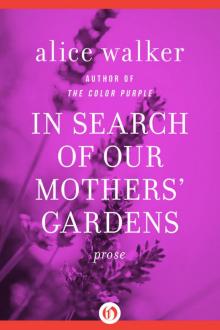 In Search of Our Mothers' Gardens: Prose
In Search of Our Mothers' Gardens: Prose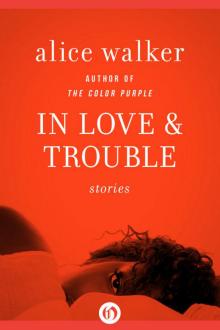 In Love and Trouble: Stories of Black Women: Stories of Black Women
In Love and Trouble: Stories of Black Women: Stories of Black Women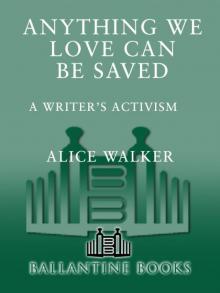 Anything We Love Can Be Saved
Anything We Love Can Be Saved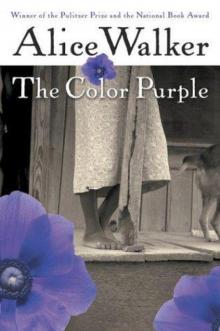 The Color Purple
The Color Purple By the Light of My Father's Smile
By the Light of My Father's Smile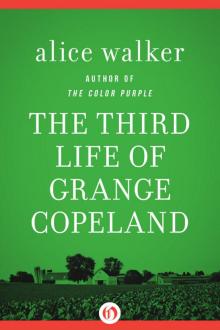 The Third Life of Grange Copeland
The Third Life of Grange Copeland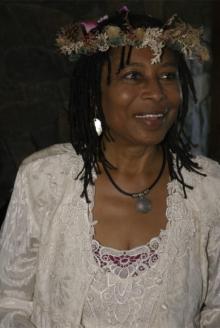 You Can't Keep a Good Woman Down
You Can't Keep a Good Woman Down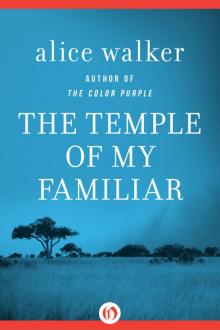 The Temple of My Familiar
The Temple of My Familiar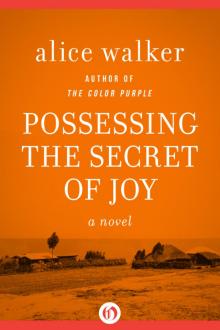 Possessing the Secret of Joy
Possessing the Secret of Joy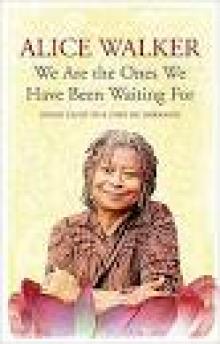 We Are the Ones We Have Been Waiting For
We Are the Ones We Have Been Waiting For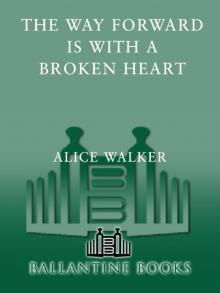 The Way Forward Is With a Broken Heart
The Way Forward Is With a Broken Heart Meridian
Meridian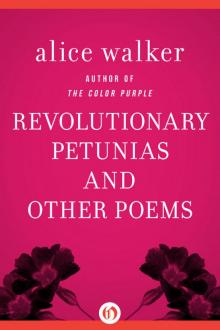 Revolutionary Petunias
Revolutionary Petunias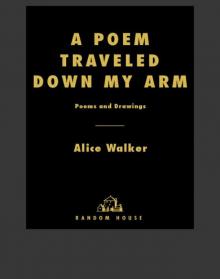 A Poem Traveled Down My Arm
A Poem Traveled Down My Arm Once
Once Horses Make a Landscape Look More Beautiful
Horses Make a Landscape Look More Beautiful Living by the Word
Living by the Word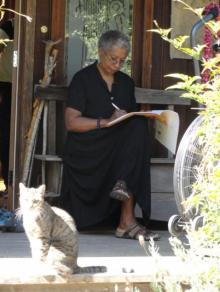 In Love and Trouble
In Love and Trouble The Color Purple Collection
The Color Purple Collection Now Is the Time to Open Your Heart
Now Is the Time to Open Your Heart Color Purple Collection
Color Purple Collection Taking the Arrow Out of the Heart
Taking the Arrow Out of the Heart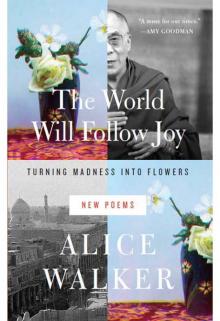 The World Will Follow Joy
The World Will Follow Joy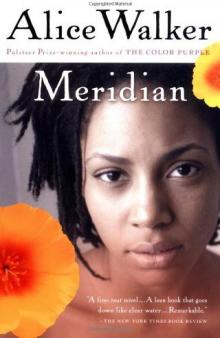 Meridian (1976)
Meridian (1976) Absolute Trust in the Goodness of the Earth
Absolute Trust in the Goodness of the Earth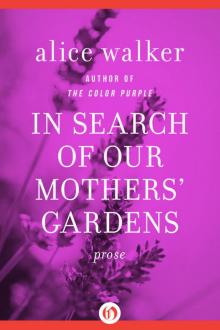 In Search of Our Mothers' Gardens
In Search of Our Mothers' Gardens